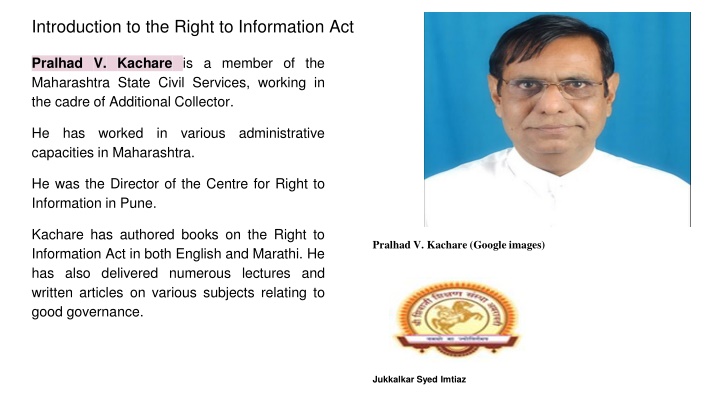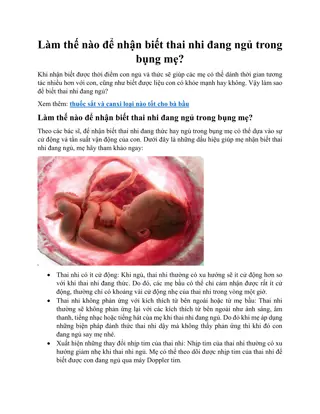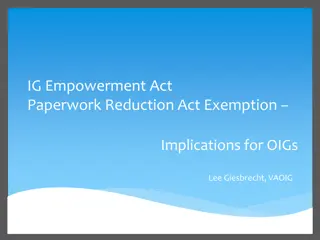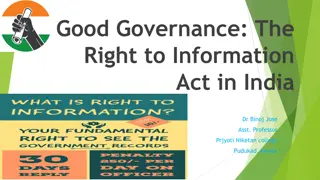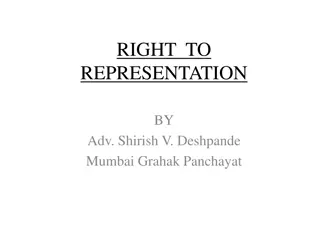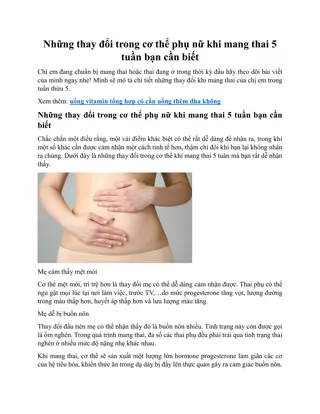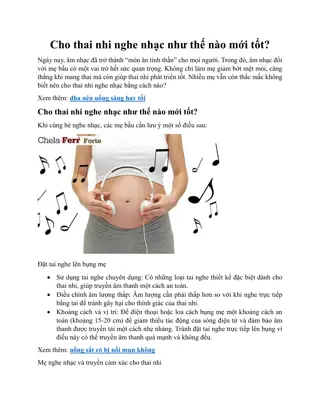Introduction to the Right to Information Act
In Maharashtra, Pralhad V. Kachare, a member of the State Civil Services, has worked to promote transparency and accountability through the Right to Information Act. His contributions, including books and lectures, have been instrumental in fostering good governance. Learn about the Act's significance, international perspective, and historical context in India.
Download Presentation

Please find below an Image/Link to download the presentation.
The content on the website is provided AS IS for your information and personal use only. It may not be sold, licensed, or shared on other websites without obtaining consent from the author.If you encounter any issues during the download, it is possible that the publisher has removed the file from their server.
You are allowed to download the files provided on this website for personal or commercial use, subject to the condition that they are used lawfully. All files are the property of their respective owners.
The content on the website is provided AS IS for your information and personal use only. It may not be sold, licensed, or shared on other websites without obtaining consent from the author.
E N D
Presentation Transcript
Introduction to the Right to Information Act Pralhad V. Kachare is a member of the Maharashtra State Civil Services, working in the cadre of Additional Collector. He capacities in Maharashtra. has worked in various administrative He was the Director of the Centre for Right to Information in Pune. Kachare has authored books on the Right to Information Act in both English and Marathi. He has also delivered numerous lectures and written articles on various subjects relating to good governance. Pralhad V. Kachare (Google images) Jukkalkar Syed Imtiaz
The Indian Governments website on the subject succinctly explains this right: The basic object of the Right to Information Act is to empower the citizens, promote transparency and accountability in government the working of the An informed citizen will be better equipped to keep necessary vigil on government and make the government more accountable to the governed. The Act has created a practical regime through which the citizens of the country may have access to information under the control of public authorities. the instruments of Google images
International Perspective It culminated in the United Nations Conference The earliest reference to the right to information on Freedom of Information held in Geneva in 1948 which is part is found in Sweden where in the year 1766 a of Article 19 of the International Covenant on Civil and Political Rights (ICCPR). India was the member of the Commission on Human Rights appointed by the convention granting right to information to all its citizens was passed and is treated as the world s first Freedom of Information Act. The Economic and Social Council of the United Nations international movement to include it in the legal which drafted the 1948 Declaration. The system gained prominence in 1946 with the Declaration stipulates that the United Nations General Assembly of the United Nations shall promote respect for, and observance of, human rights and fundamental freedoms. declaring freedom of Information to be Internationally, the Right to Information (RTI) is fundamental human right and a touchstone for also called freedom of Information (FOI) or all other liberties. Access to Information (ATI)
National History The Right to Information campaign in India begun with the Shakti Sanghatan (MKSS) movement to bring about transparency in village accounts via the demand for minimum vegas in rural India. Host entries in muster rolls where a sign of rampant corruption in the system, which promoted MKSS to information recorded in government files. The movement soon spread across India. From a very modest beginning in the villages of Rajestan, the success of MKSS has been a source of inspiration for all in India and throughout the world. It lead to the genesis of a broder discourage on the right to information in India. The right to information is a cherished right. There is no express information in the constitution of India. However, in a number of cases the Supreme Court of India has ruled that right to information flows from and is implied in Article 19 of the Constitution of India , being a fundamental right freedom of Speech and Expression and that disclosure of information as regards the functioning of the government must be the rule and secrecy and exception. It was further promoted and elevated as the lifeblood of democracy. Free flow of information and ideas is essential for the health of democracy as oxygen is required for human existence. pronouncements, there was a long struggle causing the right to information legislated. Mazdoor Kisan mention of right to demand official Along with judicial act to be
Right to Information Act: The RTI act was enacted on 15th June 2005 to provide for setting out the practical regime of Right to Information for citizens to secure access to information under the control of Public Authorities, in order to promote transparency and accountability in the working of every public authority, the Constitution of a central information commission and state information commission and for matters connected therewith or incidental thereto . The preamble to the act declares the object to be achieved by the RTI act which came into force on 12th October 2005.
Objectives: Important objectives are outlined in the preamble which seeks to bring about a balance between two conflicting interests, as harmony between them is essential for preserving democracy. 1. One is to bring about transparency and accountability by providing access to information under the control of public authorities,,and make our democracy work for the people in a real sense. It goes without saying that an informed citizen is better equipped to keep necessary vigil on the instruments of governance and make the government more accountable to the governed. The act is a big step towards making citizens informed about the activities of the government. In reality it is to promote participatory democracy. 2. The other is to ensure that the revelation of information, in actual practice, does not conflict with other public interests which include efficient operation of the governments, optimum use of limited fiscal resources and preservation of confidentiality of sensitive information. The preamble to the act specifically states that the object of the act is to harmonize these two conflicting interests.
Coverage Obligation of Public Authorities This act is applicable all over India except Jammu and The act also lays great emphasis on proactive disclosure so as to minimise the queries or request for access to information. Kashmir. The Right to Information Act is a small act containing six chapters and 31 sections. The coverage of this act is wider means publishing and Proactive providing maximum information sue moto i.e.without citizens seeking or demanding it. disclosure and it includes any authority or body or institution of self government established or constituted by or under the constitution, or by notification issued or order made by the All Public Authorities are required to disseminate as widely as possible the information as proactive disclosure seeks a democratization of publicly held information and knowledge resources which is critical for people s empowerment, especially to realize the entitlements as well as to augment opportunities for enhancing improving the quality of life. central government or state government. The bodies owned, controlled or substantially financed by the central government or state government and non-government organisation substantially financed by the central or a state government also fall within the definition of Public Authority. The financing of the body or the NGO by the government may be the options for direct or indirect. All these institutions are known as public authorities.
1. Public Authorities are also required to designate Public Information Officers (PIO), as many as required in all other offices and and administrative units to receive and deal with requests for obtaining information. To facilitate delivery of information on requests all Public Authorities are required to maintain, update and computerized their records.
Process and Procedure Information means any material in any form. It includes records, documents, memos, e-mail, opinions, advices, press releases, circulars, orders, logbooks,contracts, reports, papers, samples models and data material held in any electronic form. It also includes information relating to any private body which can be accessed by the Public Authority under any law for the time being in force. Right to information means the right to information accessible under the RTI Act which is held by or under the control of any Public Authority and includes the right to inspection of the work, documents, records, taking notes, extracts or certified copies of documents or records, taking certifies samples of material, obtaining information in diskettes, floppies, tapes, video cassettes or in any other electronic mode or through printouts where such information is stored in a computer or through printouts where such information is stored in a computer or in any other device. A citizen of India can exercise right to information . A person who desires to seek some information from a Public Authority of a central or of a state government is required to submit an application in English, Hindi or in local language, along with prescribed fee to concerned Public Information Officer. 1.
2. If the applicant belongs to below poverty line (BPL) category, he is not required to pay any fee or cost of information. There is prescribed format of application for seeking information. The application can be made on plain paper or electronically. The applicant shall not be required to give any reason for requesting the information or any personal details except those that may be necessary for contacting him. It is the duty of the Public Information Officer to provide the required information which is available, existing and under his control to the citizens within a prescribed period of thirty days for normal information, and within 48 hours in case of information relating to life and liberty after getting the necessary prescribed cost of information.
The mode of payment of application fee and cost of information is also prescribed by Appropriate Government and Competent Authorities by rules made by them. Information of a third party held by Public authorities also can be accessed by following the procedure laid down in this act. Failure to give any response within prescribed period is treated as refusal to give information. Whenever a Public Information Officer refuses to provide information, the applicant must be informed of the reasons why information cannot be provided. The applicant also needs to be informed of the name and address of the First Appellate Authority and the appeal period so that if the applicant is not satisfied, appeal remedy can be available.
Exemptions from disclosure Appeals and complains The right to seek information from a Public Authority is not absolute. Sections 8 and 9 of the Act enumerate the categories of information which are exempt from disclosure. At the same time Schedule II of the Act contains the names of the Intelligence and Security Organisation which are exempt from the purview of the Act. The exempted organisations, however have to supply information relating to allegations of corruption and human rights violations. There is a provision of first appeal to First Appellate who is always a higher officer of PIO. Any citizen who has been refused information, who has not received any response within the prescribed period or who is not satisfied with the information received can make first appeal within 30 days from the date of such situation. It is expected that the first Appellate Authority shall hear all concerned including the Appellant and enquire into the appeal and as far as possible see to it that the access to information sought is facilitated through a PIO if the request is within the law. First Appeal has to be decided normally within 30 days and if there is any abnormal situation within 45 days with reasons to be written in the decision. There is no obligation on public authorities to provide information which is exempt under Section 8 and 9 unless there is overriding public interest in disclosure organisations included in the second schedule except information relating to allegations of corruption and human right violations. and also from the
The Information Commission has power to impose penalty of rupees 250/ per day not exceeding rupees 25 thousand in cases where there is unreasonable delay, refusal to provide or receive application, refusal to provide information, or providing false or misleading information, etc. and also there is provision of recommending disciplinary action against defaulting PIO after giving him an opportunity to be heard to stop the provisions of the RTI Act shall have an overriding effect, except in the case of those organisations dealing with security and intelligence that have been exempted from the purview of RTI Act. If a citizen is not satisfied with the decision of first appeal, there is provision for a second appeal to Information Commission within 90 days. There is also provision of making a complaint to the information commission about any issue of non-implementation or wrong implementation of RTI Act by Public Authorities. There is however, no time limit prescribed for the disposal of second appeal or complaint by information commission. There are two types of Information Commissions in India - Central Information Commission and State Information Commission- to receive and decide appeals and complaints against central government and Public Authorities and State Government Public Authorities respectively.
